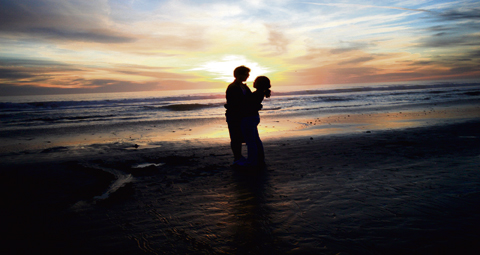August 28 | ![]() 0 COMMENTS
0 COMMENTS ![]() print
print

Getting to the heart of human nature
Fr Ronald Rolheiser
An American humourist was once asked what he loved most in life. This was his reply: “I love women best; whiskey next; my neighbour a little; and God hardly at all!”
This flashed in my mind recently when—while giving a lecture—a woman asked this question: Why did God build us in one way and then almost all of the time expect us to act in a way contrary to our instincts? I knew what she meant. Our natural instincts and spontaneous desires generally seem at odds with that towards which they are supposedly directed, namely, God and eternal life.
A religious perspective—it would seem—calls us to reverse the order described by that American humourist, that is, we’re to love God first, our neighbour just as deeply, and then accord to the human pleasures we are so naturally drawn to a very subordinate role. But that’s not what happens most of the time. Generally we are drawn—and drawn very powerfully—towards the things of this earth: other people, pleasure, beautiful objects, sex, money, comfort. These seemingly have a more powerful grip on us than do the things of faith and religion.
Doesn’t this then put our natural feelings at odds with how God intended us to feel and act? Why are we, seemingly, built in one way and then called to live in another way?
The question is a good one and, unfortunately, is often answered in a manner that merely deepens the quandary. Often we are simply told that we shouldn’t feel this way, that not putting God and religious things first in our feelings is a religious and moral fault, as if our natural wiring was somehow all wrong and we were responsible for its flaw. But that answer is both simplistic and harmful, it misunderstands God’s design, lays a guilt-trip on us, and has us feeling bipolar vis-à-vis our natural make-up and the demands of Faith.
How do we reconcile the seeming incongruity between our natural make-up and God’s intent for us?
We need to understand human instinct and human desire at a deeper level. We might begin with St Augustine’s memorable phrase: “You have made us for yourself, Lord, and our hearts are restless until they rest in you.” When we analyse our natural makeup, natural instincts, and natural desires more deeply, we see that all of these ultimately are drawing us beyond the more-immediate things and pleasures with which they appear to be obsessed. They are drawing us, persistently and unceasingly, towards God.
Karl Rahner—in trying to explain this—makes a distinction between what we desire explicitly and what we desire implicitly. Our instincts and natural desires draw us towards various explicit things: love for another person, friendship with someone, a piece of art or music, a vacation, a film, a good meal, a sexual encounter, an achievement that brings us honour, a sporting event, and countless other things that, on the surface at least, would seem to have nothing to do with God and are seemingly drawing our attention away from God. But, as Rahner shows—and as is evident in our experience—in every one of those explicit desires there is present, implicitly, beneath the desire and as the deepest part of that desire, the longing for and pursuit of something deeper. Ultimately we are longing for the depth that grounds every person and object, God. To cite one of Rahner’s more graphic examples, a man obsessed with sexual desire who seeks out a prostitute is, implicitly, seeking the bread of life, irrespective of his crass surface intent.
God didn’t make a mistake in designing human desire. God’s intent is written into very DNA of desire. Ultimately our make-up directs us towards God, no matter how obsessive, earthy, lustful, and pagan a given desire might appear on a given day. Human nature is not at odds with the call of faith, not at all.
Moreover, those powerful instincts within our nature, which can seem so selfish and amoral at times, have their own moral intelligence and purpose, they protect us, make us reach out for what keeps us alive, and, not least, ensure that the human race keeps perpetuating itself. Finally, God also put those earthy instincts in us to pressure us to enjoy life and taste its pleasures—while God, like a loving old grandparent watching her children at play, remains happy just to see her children’s delight in the moment, knowing that there will be time enough ahead when pain and frustration will force those desires to focus on some deeper things.
When we analyse more deeply God’s design for human nature and understand ourselves more deeply within that design, we realise that, at a level deeper than spontaneous feeling, and at a level deeper than the wisecracks we make about ourselves, we in fact do love God best; love our neighbour quite a bit; and, very happily, love whiskey and the pleasures of life quite a bit as well.
— Fr Ronald Rolheiser is a priest and member of the Missionary Oblates of Mary Immaculate. He is president of the Oblate School of Theology in San Antonio, Texas. Visit his website at www.ronrolheiser.com











